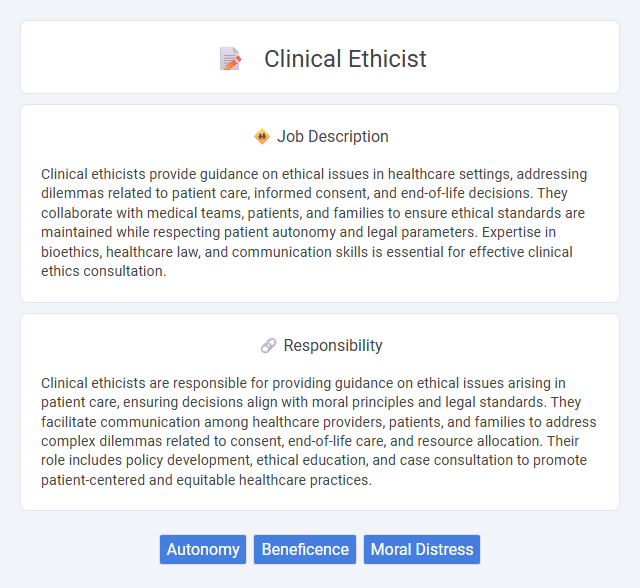
Clinical ethicists provide guidance on ethical issues in healthcare settings, addressing dilemmas related to patient care, informed consent, and end-of-life decisions. They collaborate with medical teams, patients, and families to ensure ethical standards are maintained while respecting patient autonomy and legal parameters. Expertise in bioethics, healthcare law, and communication skills is essential for effective clinical ethics consultation.
Individuals with strong empathy, excellent communication skills, and a solid understanding of medical ethics are likely suitable for a clinical ethicist role. Those comfortable navigating complex moral dilemmas in healthcare settings may find this job fitting. People who struggle with ambiguity or have difficulty mediating differing viewpoints might face challenges in this position.
Qualification
Clinical ethicists typically hold advanced degrees in bioethics, philosophy, medicine, or law, with many possessing a Master's or PhD in clinical ethics or a related field. Certification from recognized bodies such as the American Society for Bioethics and Humanities (ASBH) enhances professional credibility and demonstrates expertise in ethical consultation. Strong communication skills, a deep understanding of healthcare practices, and experience in ethical decision-making within clinical settings are essential for effective performance in this role.
Responsibility
Clinical ethicists are responsible for providing guidance on ethical issues arising in patient care, ensuring decisions align with moral principles and legal standards. They facilitate communication among healthcare providers, patients, and families to address complex dilemmas related to consent, end-of-life care, and resource allocation. Their role includes policy development, ethical education, and case consultation to promote patient-centered and equitable healthcare practices.
Benefit
Clinical ethicists likely provide significant benefits by guiding healthcare professionals in making morally sound decisions that prioritize patient well-being. Their expertise may reduce conflicts and enhance communication among medical teams, patients, and families. This role probably contributes to improved patient outcomes and fosters trust within healthcare settings.
Challenge
The role of a clinical ethicist likely involves navigating complex moral dilemmas where patient autonomy and medical recommendations may conflict. They probably face the challenge of balancing diverse stakeholder perspectives while ensuring ethical standards are upheld in high-pressure healthcare environments. The probability of encountering emotionally charged situations suggests a need for strong communication and conflict resolution skills.
Career Advancement
Clinical ethicists advance their careers by gaining specialized certifications such as the Certified Healthcare Ethics Consultant (CHEC) credential and pursuing advanced degrees in bioethics or healthcare law. Experience in hospital ethics committees and participation in interdisciplinary case consultations significantly enhance professional growth and leadership opportunities. Developing strong communication and mediation skills supports roles in policy development and ethics education, leading to senior positions within healthcare organizations.
Key Terms
Autonomy
Clinical ethicists play a pivotal role in safeguarding patient autonomy by ensuring that healthcare decisions align with individuals' values and informed consent principles. They provide guidance on ethical dilemmas related to patient rights, confidentiality, and decision-making capacity in complex clinical settings. Emphasizing autonomy, clinical ethicists facilitate respectful collaboration among patients, families, and medical teams to uphold ethical standards and patient-centered care.
Beneficence
Clinical ethicists play a crucial role in promoting beneficence by ensuring that patient care decisions prioritize the well-being and best interests of individuals. They analyze complex medical cases to balance risks and benefits, facilitating morally sound treatment plans that enhance patient outcomes. Their expertise supports healthcare teams in navigating ethical dilemmas to uphold compassion and integrity in clinical practice.
Moral Distress
Clinical ethicists specialize in addressing moral distress experienced by healthcare professionals when ethical dilemmas arise in patient care. They facilitate guided discussions, providing support that helps resolve conflicts between medical teams, patients, and families to maintain ethical integrity. By implementing ethical frameworks, clinical ethicists enhance decision-making processes and reduce psychological burdens associated with moral uncertainty in clinical settings.
 kuljobs.com
kuljobs.com